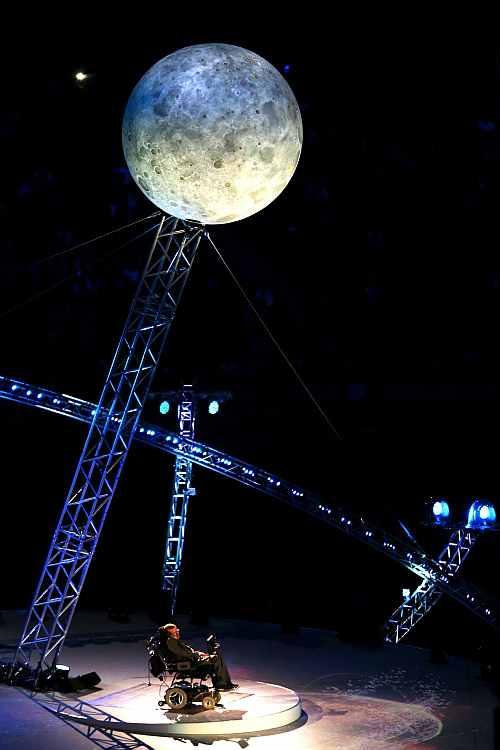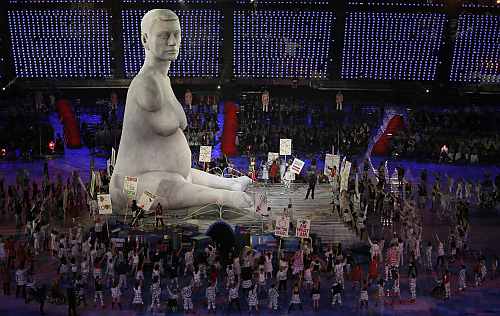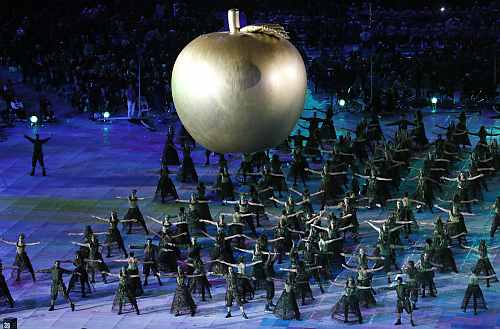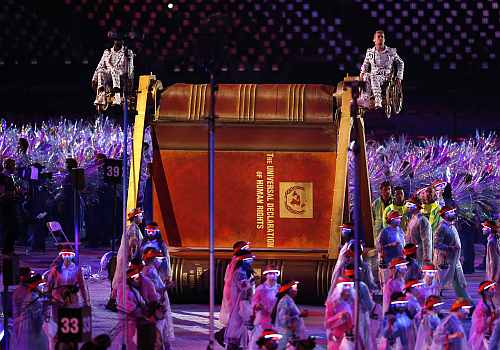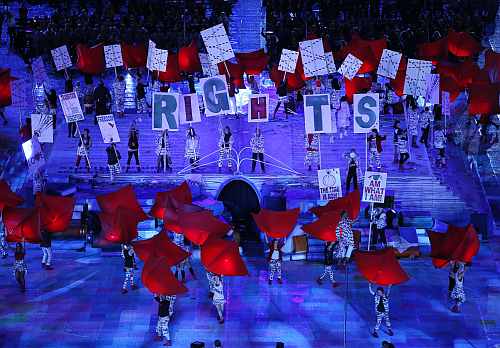 | « Back to article | Print this article |
Hawking says look to stars as Paralympics opens
Wheelchair-bound physicist Stephen Hawking challenged athletes to "look to the stars" on Wednesday as he helped open a record-setting Paralympics Games that will run for 11 days in near sold-out venues.
Close on the heels of the hard-act-to-follow London 2012 Olympics, thousands of dancers and stunning fireworks added to the good cheer on the opening night for an audience of 80,000.
Hawking, diagnosed with motor neurone disease at the age of 21 and told in 1963 he had two years to live, began the ceremony by reading from the stage.
"Look up at the stars and not down at your feet. Be curious," Hawking said from his wheelchair, speaking through his famous computerised voice system for communication.
Biggest number of athletes
The London Paralympics will host the biggest number of athletes since their official birth in 1960 at the Rome Games, with 4,280 competitors representing 164 nations compared to 400 participants from 23 countries in the Italian capital.
South Africa's Oscar Pistorius, who became the first double amputee to compete in the Olympics earlier this month, and was a flag-bearer for the Paralympics opening, told a news conference earlier he had seen a shift in interest towards disabled sport.
The rising interest has been reflected in ticket sales, with a record 2.4 million of the available 2.5 million sold, and the remaining 100,000 released in batches of 10,000 each day.
More than 50 percent of the tickets sold for 10 pounds or less, Olympic and Paralympic organisers LOCOG said.
"Up to 2004 I didn't know much about Paralympics. The biggest turnout we had was maybe 20,000. Usually around 7,000 a day," said Pistorius, who runs using carbon-fibre prosthetic blades after he was born without a fibula in both legs.
"The UK deal with disability in a really amazing way. There are a lot of people who don't focus on the disability any more, they focus on the athletes' abilities. They're treated as elite sportsmen and women," the 25-year-old Pistorious added.
Inspiring and breathtaking show
In scenes like those which gripped the world during the July 27 opening extravaganza at the Olympic Stadium in east London, a similarly inspiring and breathtaking show left the 80,000 fans and millions of TV viewers open-mouthed from the start.
Queen Elizabeth, who made her film debut as a "Bond girl" last month in film director Danny Boyle's opening ceremony, was again on hand to welcome the athletes who danced and waved their flags while gazing around them in the impressive arena.
The Queen declared the Games open following the mammoth procession of athletes into the Olympic Stadium and International Paralympic Committee president Philip Craven's speech.
'Homecoming' Games
"What happens here has the energy to change every single one of us. Welcome to the record 164 committees who have brought with them the best athletes ever," Craven said, speaking alongside London Games chairman and two-time gold medallist Sebastian Coe.
"Welcome home to the Paralympic Games," Coe said to an enormous roar of approval.
"Welcome home to a movement that shows what sport is all about. Sport refuses to take no for an answer. Prepare to be moved," he added.
The Paralympics were conceived at the 1948 London Olympics by German neurologist Ludwig Guttmann, who had opened a spinal injuries centre at Stoke Mandeville in England for injured World War Two soldiers.
'London is going to be the tipping point'
On the day of the opening ceremony in 1948, Guttmann held the first archery competition for wheelchair athletes.
Those set to push their bodies to the limit in London this time round believe the 'homecoming' will be incredible.
"I think London is going to be the tipping point. I think London will take the Paralympics to a point where it has never been before," American single amputee sprinter Jerome Singleton, who did not know about the Paralympics until 2006, told Reuters.
"Talking to past Paralympians they say 2000-2004 it started to rise. Then they said you will never see another Paralympics like 2008.
"Now we're in London, where it all started and the media coverage is finally starting to come around. The world is coming to embrace the second largest sporting event in the world," Singleton said.
Compatriot and sitting volleyball player Kari Miller said the days when audiences felt sorry for Paralympians had passed.
"There's less of the 'ah aren't they cute' and more of the realisation our sports aren't cute, they're tough," she said.

© Copyright 2024 Reuters Limited. All rights reserved. Republication or redistribution of Reuters content, including by framing or similar means, is expressly prohibited without the prior written consent of Reuters. Reuters shall not be liable for any errors or delays in the content, or for any actions taken in reliance thereon.
